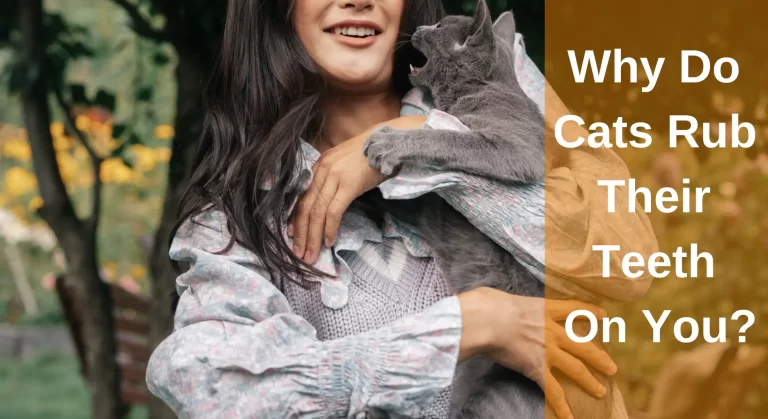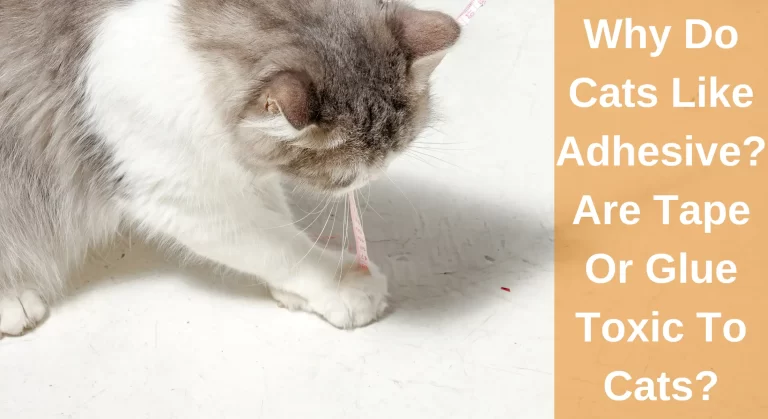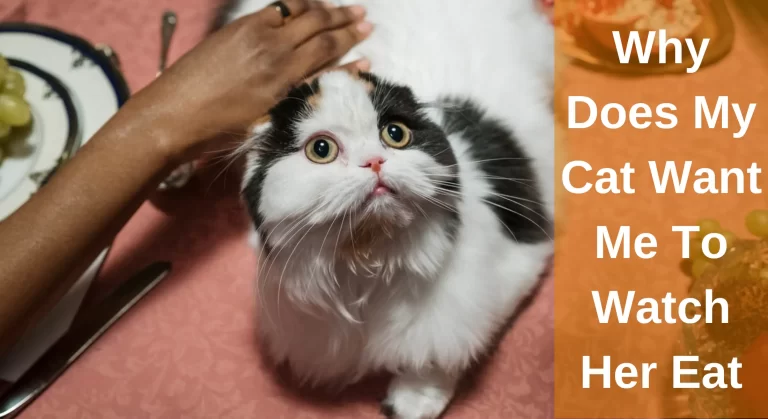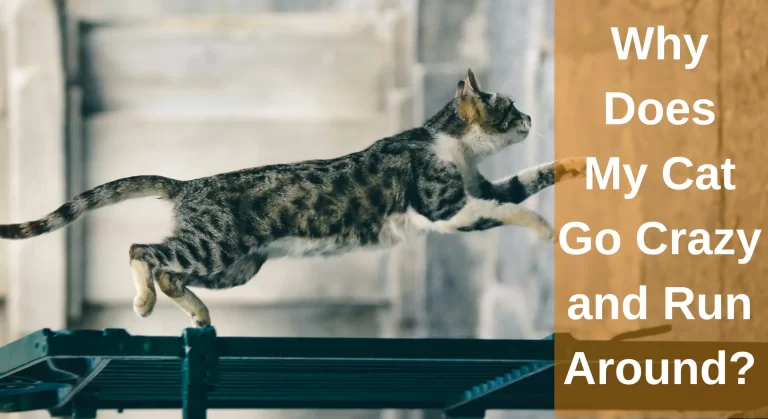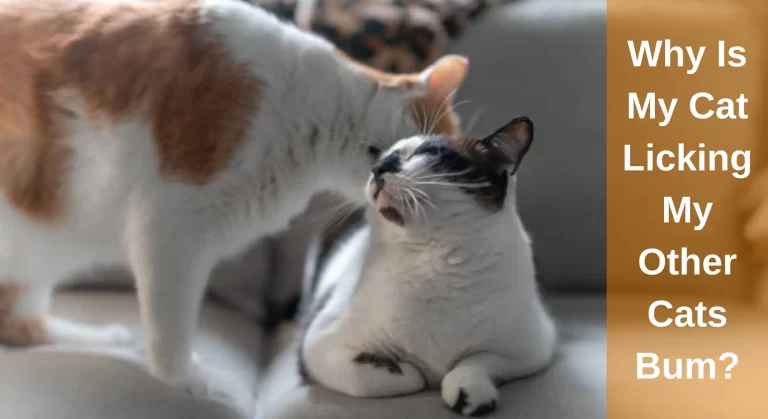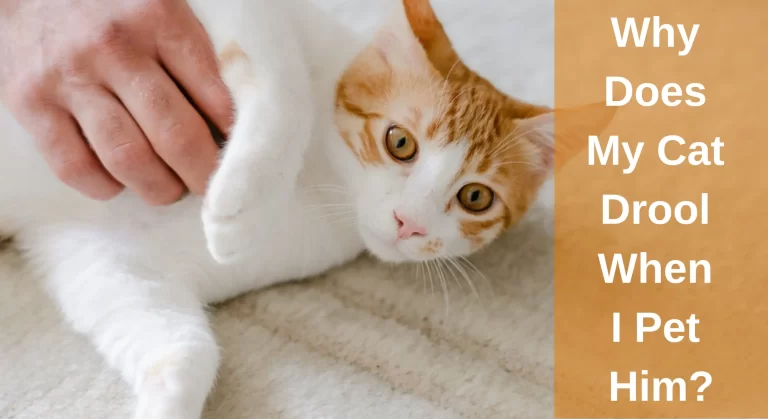Why Is My Cat Breathing Fast And Purring?
Perhaps the most contenting sound your feline make is purring. Breathing while purring is more deliberate than you imagine. But most cat owners ask if the cat breathing fast and purring. Is it a normal sign?
Purring is audible, while the breathing of a cat is a silent act. So, if your cats purr while breathing normally, then it’s common because when cats breathe, the purring sound is produced. However, in some cases, it’s also normal if your cat breathes heavily because it may indicate that they’re angry or feeling stressed.
But if your cats make any strange noises from airways, noses, throats, or lungs while breathing fast and purring, then you must call your vet. It may be due to some severe breathing problems.
So, if your feline is purring and breathing quickly, it may also be problematic. You might be confused about your cat’s situation. But this article will help you know everything about your cat’s heavy breathing and purring. Continue reading to learn when a cat’s fast breathing and purring causes problems and common conditions in which it usually happens.
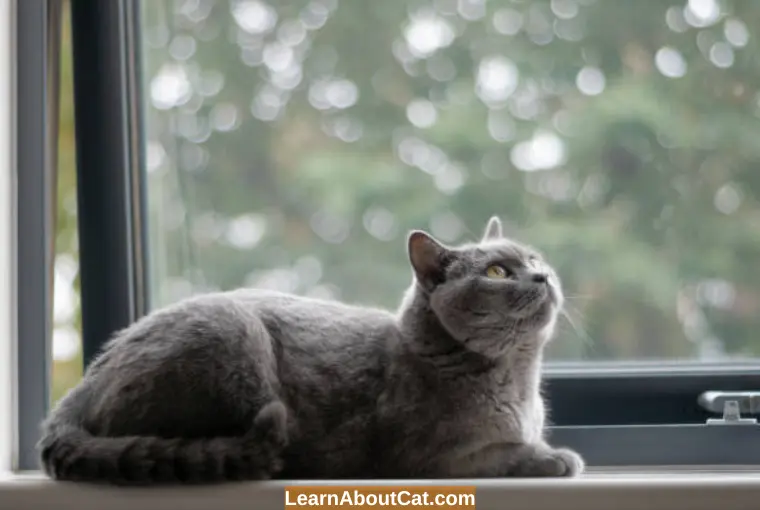
Do Cats Breathe Faster When Purring?
Yes, it’s common to hear your cat’s purring while breathing fast. In general, cats breathe more quickly than us, which vibrates the vocal cords and produces this purring sound. It’s normal that their respiratory rate typically rises. So, no need to worry about why cats breathe fast and purr as well.
Normally felines breathe 20 to 30 times each minute. Obviously, their breathing rate will increase when they’re thrilled, having fun, or experiencing strange things. Moreover, the tone, rhythm, and frequency of a cat’s breath also vary when it purrs while performing such activities.
Why Is My Cat Breathing Fast While Purring?
Cats also purr when they experience pain; in this case, their purring is typically fast and short-term and is accompanied by fast breathing. Tachypnea, the medical word for faster-than-normal breathing, is the way by which your cats want to convey that they’re in pain. Your cat may be agitated or in discomfort if they’re purring and panting quickly.
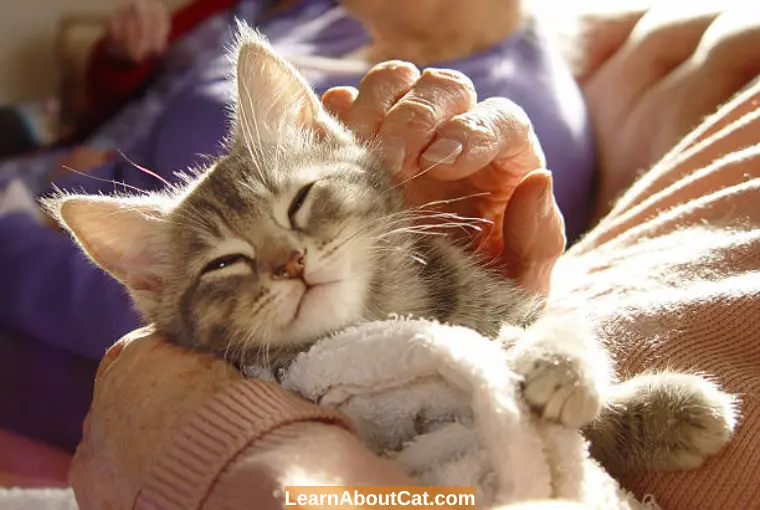
You identify your cat’s purr by observing its body posture. For instance, a feline that is purring while resting on its belly upwards, half eyes closed, loose tail loose, usually indicates that it’s really happy.
Moreover, purring is also a type of breathing. When cats feel pain or happiness, their brain instructs the larynx muscles to contract rapidly whenever it purrs. So, if your cat is breathing fast due to excitement or pain, the twitching of the larynx muscles creates a soft purring sound.
Is My Cat Purring or Having Trouble Breathing?
If you feel that your cat suddenly started to breathe heavily, then by observing its body gestures, you can tell whether it’s stress breathing or normal. If your felines are content and calm, pay close attention to what they are saying, and you feel a gentle, constant murmur, then it’s purring.
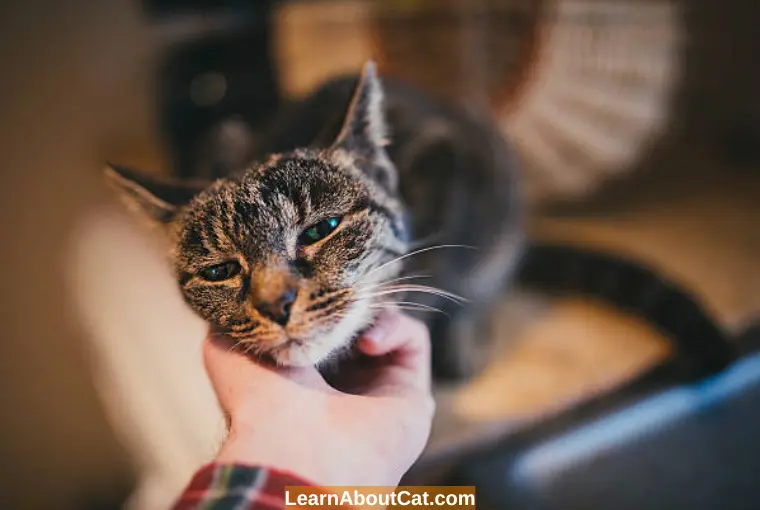
A cat continuously purrs between inhalations and exhalations because a cat’s purring is caused by air passing through the larynx, which creates this sound. However, if a cat is breathing heavily, then it won’t be purring, and it’ll be different than usual.
During the cat’s heavy breathing, the purring may sound like snoring, and the breathing sound will be louder than purring; in normal cases, you can’t listen to the cat’s breathing.
Cat Breathing Heavily While Purring: Is It Normal?
If your cat purrs while breathing heavily, it may indicate some respiratory or other illness. If your cat’s respiratory center and chest nerves are working well, then their breath will be smooth and normal. The normal breathing rate may vary from 12-16 times per minute at rest. While it can also be 20-30 times per minute, above 30 may cause trouble for your cats.
There are three primary types of heavy breathing:
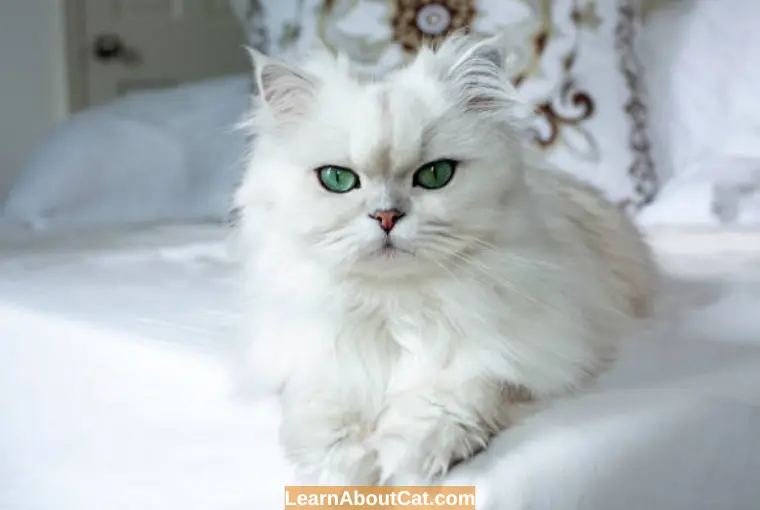
1. Dyspnea Breathing
Dyspnea occurs when your feline’s breathing becomes laboured. During this, they use their mouths, and their chest and tummy move when they breathe fast. Cats with this illness are frequently agitated and can’t sleep. It may occur due to the following:
Hazardous substances stuck in their throat/oesophagus
- Infections in the lungs
- Lungs are full of fluid
- Chest injury
- Abdominal issues like bloating, etc.
2. Tachypnea Breathing
Your cat may also breathe rapidly and deeply due to fatigue, and this causes tachypnea. The tiredness caused by this laborious breathing makes your felines lethargic and hesitant to roam or engage in any activity. The factors which cause this heavy breathing are:
- Heartworms
- Anaemia
- Blood is short of oxygen level.
- Fever
3. Panting
Cats pant after exerting themselves or after being exposed to hot weather. This open-mouth panting aids your cat’s ability to regulate its body heat in warm temperatures. Panting can occasionally be an indication of really serious problems like lung or cardiovascular disease. Your cat may pant as a result of a tense environment, such as seeing the clinic.
It’s a normal situation if your feline pants after vigorous playing or a hike. Cats occasionally pant or breathe heavily when playing or immediately following a meal in warm weather.
Also Read: Why Do Cats Pant in Car?
How Do Cats Breathe When Purring?
When felines trigger any emotion, their brain sends signals to the larynx muscles and diaphragm to act rhythmically to produce a purring sound. So, when cats inhale and exhale, the air vibrates the vocal cords 25-150 per second to produce this purr.
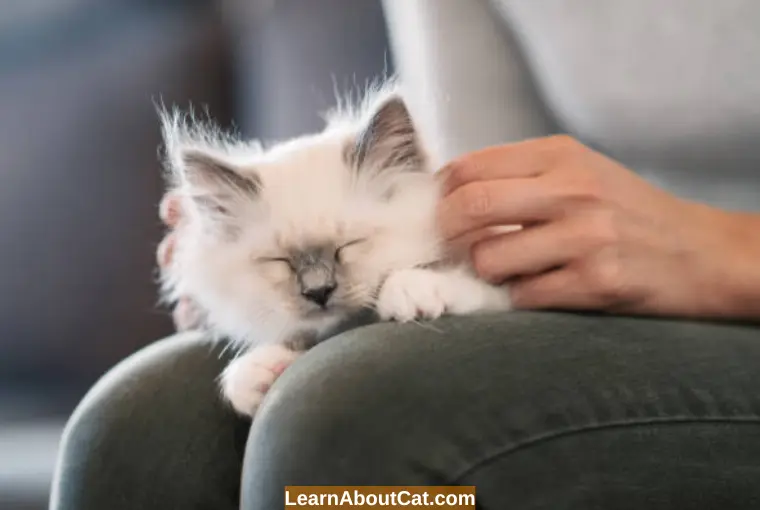
Usually, cats don’t breathe with their mouths rather they use their noses for breathing. Moreover, they breathe silently while purring in normal situations. But if cats breathe fast and purr as well, then there might be some underlying disorder. Moreover, they only breathe with their mouths when they’re anxious.
Additionally, house cats purr only while breathing in and out, whereas larger cats only produce a purring sound when they breathe out.
Do Cats Breathe Differently When They Purr?
No, cats can’t breathe differently while purring; only their breathing gets intense when they’re facing some disorder or anxiety. So, if your feline is purring normally while breathing, it shows its happiness or even sadness.
Moreover, to know whether your cat is breathing differently, you must notice that it is breathing from her mouth or nose. Because a cat never breathes from its mouth, any transition in its breathing will help you know the underlying problem.
Why Does My Cat Purr Sound Like Breathing?
The stertor is a noisy breathing rhythm when inhaling. It’s low-frequency fluid motions or the motions of loose or floppy tissue which produce the snoring sound that might hear like purring. It may occur due to blockage in the pharynx or nasal cavity that may feel like congestion. Due to this stertorous breathing, purring may sound like breathing or snoring. It occurs due to cold, flu, allergies, or any other nasal or throat issues.
What Does it Mean When Your Cat Purrs but Breathes Differently?
This question is asked frequently by most cat owners why does my cat’s breathing seem laboured? There are many serious and common reasons behind your cats breathing differently or heavily which are mentioned below:
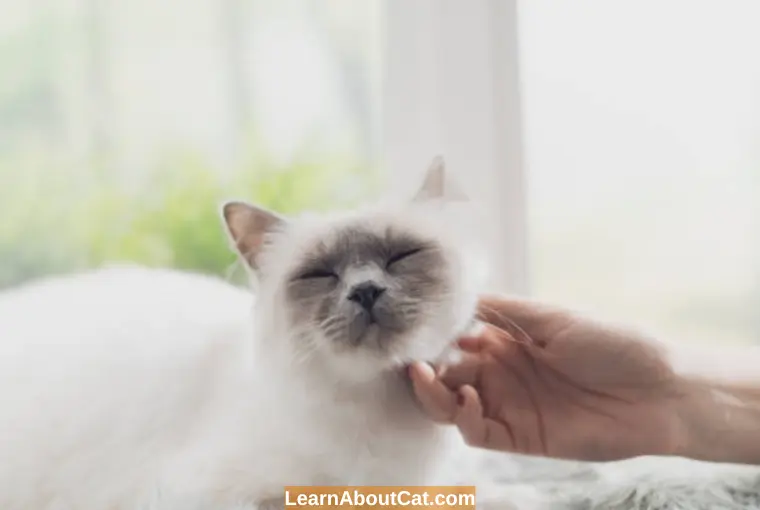
- Foreign allergens may obstruct the larynx
- Allergies
- Congestion due to cold or flu
- Shortage of oxygen level in the blood
- Anaemia
- Injuries or tumours in the chest or larynx
- Lung bleeding or other disorders
- Fluid-filled lungs
- Heart diseases
- Pain or emotional anxiety
- Respiratory diseases, etc.
How Do You Tell If a Cat’s Breathing is Laboured?
It can be difficult to determine when purring is good or not because purring can signify either joy or anxiety.
But a skilled veterinarian can tell whether the respiration is rapid or regular. Don’t forget to provide your vet with a complete medical background of your feline and also tell him when the symptoms occur. This will aid in the diagnosis of trauma, combat injuries, and other reasons which causes heavy breathing in your felines.
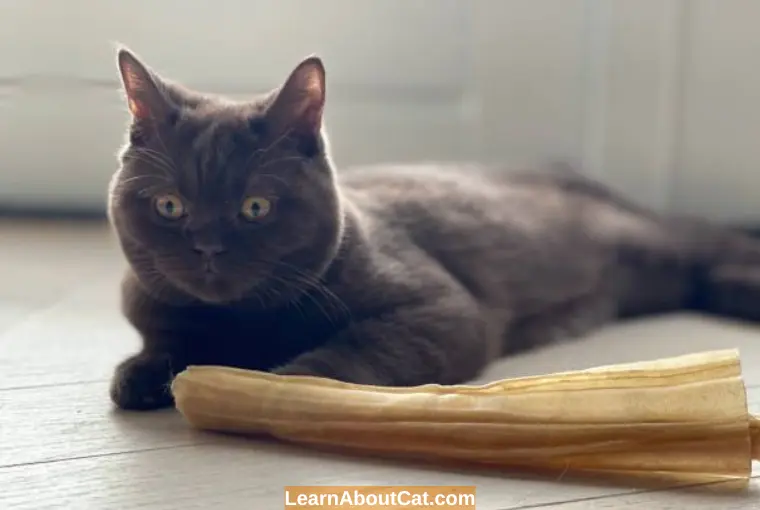
Moreover, follow the below guidelines to learn about your cat’s laboured breathing:
- Monitoring the respiratory rate; chest vibrations.
- Examining the colour of the gums to determine whether organs are getting enough oxygen
- Perform blood tests to check any illness caused by parasitic worms
- Chest X-rays to look for malignancies or foreign substances
- Ultrasound to check on a bigger heart or other respiratory organs
Frequently Asked Questions
Do cats breathe funny when they purr?
According to most cat owners, the most pleasant and funny sound felines can produce is purring. It’s such a pleasing scene to imagine a cat purring excitedly when you stroke his head.
Why does my cat sound congested when purring?
If you feel that your cat is experiencing congestion while purring, then it may be due to the following:
1. Respiratory disorder
2. Cold or flu
3. Fluid in the lungs
4. Nasal cavity obstruction due to foreign particles
Does purring affect my cat’s breathing rate?
Yes, purring increases the cat’s breathing rate, but it’s normal. Because while breathing, along with purring, the larynx muscles and diaphragm are involved. Purring causes more stress over the larynx muscles, due to which the breathing rate may increase.
How do I know if my cat is breathing too fast?
By measuring the breathing rate of cats which in normal situations is 20-30 breaths per minute. But, an active cat has a normal breathing rate of 15-60 breaths per minute minutes while purring. But if your cat is sleeping and purring along with breathing, then it must have 30 breaths per minute and should not exceed it. If your cat breathes heavily while purring, then check their rate; if it exceeds 60 breaths per minute, then it’s an alarming sign.
What causes laboured breathing in cats?
Acute exacerbations of asthma are the most common causes of respiratory distress, while heart failure causes fluid in the lungs to build up and pleural effusions, which make it difficult for cats to expand their chests because of a collection of fluid surrounding the lungs.
Final Thoughts
It’s critical to distinguish whether your felines are panting rapidly because of a disease or is simply breathing normally. If they’re breathing the same or even they’re heavy while purring, and everything seems normal, then you don’t need to freak out. But take your feline to the veterinarian if you detect any other indicators of distress along with breathing difficulties.
But keep in mind that purring normally has a good connotation and that rapid breathing during purring is totally natural!
Related Posts:
- Why Do Cats Purr When You Pet Them?
- Why Do Cat’s Noses Get Wet When They Purr?
- Why Do Cats Purr When They Sleep?
- Why Is My Cat Drooling When Purring?
- Why Does My Cat Purrs And Bites Me Gently?
- Do Cats Stop Purring When They are Dying?
- Do Cats Purr When They Are in Pain?
- Can Cats Control Their Purring?
Who is Isabella?
My name is Isabella, and I am a dedicated and knowledgeable cat enthusiast. With years of experience caring for cats and a deep love for felines, I made a mission to help other cat lovers navigate the challenges of cat ownership.

